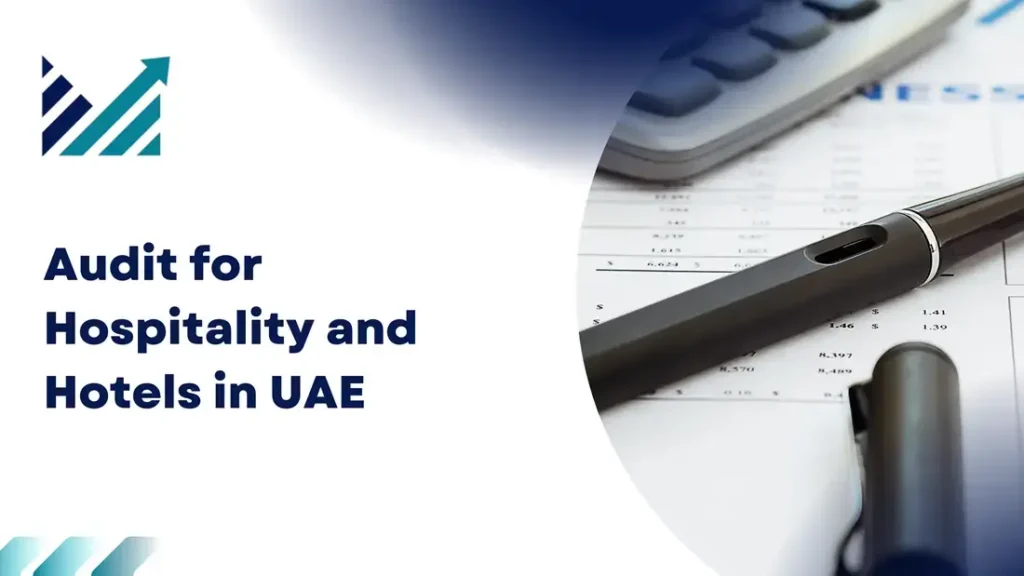
The hospitality industry in the UAE is renowned for its luxury hotels, sprawling resorts, and world-class guest experiences. Behind the glamour lies a complex operational and financial structure that needs careful oversight. Auditing plays a vital role in this process. Whether you’re a hotel owner, general manager, or part of the finance team, understanding how audit for hospitality industry help protect your assets and reputation is essential.
In this guide, we explore the unique challenges of auditing in hospitality, what areas are audited, why audits matter specifically in the UAE, and practical steps to make the process work in your favor.
Challenges for Auditing in the Hospitality Industry
Auditing hospitality businesses isn’t always straightforward. Hotels and resorts operate around the clock, manage large volumes of transactions daily, and often deal with multiple revenue streams. Here are some common challenges auditors face:
- High transaction volume: From room bookings to event management, restaurants, spas, and more — tracking and reconciling every transaction can be complex.
- Diverse revenue streams: Hotels generate income from different services, each with its own accounting treatment.
- Cash handling: Many hospitality businesses still handle significant cash transactions, increasing the risk of mismanagement or fraud.
- Seasonality: Demand fluctuates significantly during peak tourist seasons and special events, complicating forecasting and budget variance analysis.
- Regulatory compliance: The UAE hospitality sector must comply with national laws, local regulations, and international standards.
- Technology integration: Modern hotels use various software for reservations, property management, and accounting, which must be accurately integrated.
Understanding these challenges is the first step to ensuring a thorough and effective audit process.
Auditing Areas in the Hospitality Industry
Auditors look at several core areas to ensure financial accuracy and operational efficiency. Here are some of the main focus areas:
- Room revenue: Ensuring reported occupancy matches actual usage and that pricing strategies are consistently applied.
- Food & beverage revenue: Verifying sales data from restaurants, bars, and room service against accounting records.
- Payroll: Examining wage calculations, overtime, and compliance with UAE labor laws.
- Inventory management: Checking the accuracy of stock levels for food, beverages, linens, and maintenance supplies.
- Cash and bank reconciliations: Ensuring that physical cash matches reported figures and that bank accounts are correctly reconciled.
- Fixed assets: Auditing purchases, depreciation schedules, and asset disposals.
- Contracts and leases: Reviewing terms to ensure compliance and proper recording of liabilities.
- Expenses and procurement: Validating that purchases are authorized and necessary, and vendor payments are correctly documented.
Auditors also check the internal controls around these areas to identify weaknesses or potential risks.
Importance of Auditing for the Hospitality Industry in UAE
In a competitive market like the UAE, where tourism and hospitality are key contributors to the economy, regular audits offer more than regulatory compliance.
- Protecting reputation: Reliable financial reporting builds trust among investors, regulators, and guests.
- Operational insights: Audits reveal inefficiencies, helping managers make informed decisions.
- Regulatory requirements: UAE laws and the Federal Tax Authority (FTA) require accurate financial records, especially for VAT compliance.
- Investor confidence: Regular audits assure investors that funds are properly managed.
- Fraud prevention: By detecting discrepancies early, audits help mitigate financial losses.
For international brands operating in the UAE, audits also help ensure adherence to global corporate standards and local laws simultaneously.
Types of Auditing for the Hospitality Industry
Auditing isn’t a one-size-fits-all process. Hospitality businesses often use a combination of different types of audits:
- Financial audits: Focused on financial statements to ensure accuracy and compliance with accounting standards.
- Operational audits: Review internal processes to identify inefficiencies or risks.
- Compliance audits: Ensure the business adheres to UAE laws, industry regulations, and tax requirements.
- Forensic audits: Used if fraud is suspected, to investigate and quantify potential losses.
- IT audits: Assess the security and reliability of technology systems used in hotel operations.
Selecting the right combination depends on business size, ownership structure, and strategic objectives.
Essentiality of Internal Audit in the Hospitality Industry
Internal audits are conducted by a business’s own team or an outsourced internal audit firm. They provide several benefits:
- Early issue detection: Identify problems before external auditors or regulators do.
- Process improvement: Recommend ways to make operations more efficient.
- Risk management: Help the business proactively address financial, operational, and compliance risks.
- Continuous monitoring: Regular internal audits keep management updated on the state of internal controls.
While internal audits are not legally required, they are strongly recommended, especially for larger hotels or hospitality groups.
Essentiality of External Audit in the Hospitality Industry
External audits are usually conducted by licensed audit firms. They add an additional layer of trust and accountability:
- Regulatory compliance: Satisfy requirements from the UAE Ministry of Economy and the Federal Tax Authority.
- Investor and stakeholder assurance: Prove to external stakeholders that financial statements are credible.
- Objectivity: Provide an unbiased perspective that internal teams might miss.
- Benchmarking: External auditors can compare the business to industry standards.
In the UAE, most hotel operators — especially those structured as LLCs or part of international chains — are required to perform annual external audits.
Steps in the Hospitality Audit Process
A structured audit process helps minimize disruption and ensures thorough coverage. Here’s what it typically looks like:
- Planning: Define the scope, objectives, and timelines.
- Understanding the business: Auditors familiarize themselves with hotel operations, revenue streams, and control systems.
- Risk assessment: Identify high-risk areas that need extra attention.
- Fieldwork: Collect evidence by reviewing documents, observing processes, and conducting interviews.
- Analysis and testing: Validate records against supporting documentation.
- Reporting: Present findings, recommendations, and an audit opinion.
- Follow-up: Ensure management addresses identified issues.
Communication between auditors and hotel management throughout this process helps reduce misunderstandings and keeps the audit on track.
Choosing the Right Auditor for the Hospitality Industry
Selecting an auditor in UAE isn’t just about compliance — it’s about adding value to your business. Consider these factors:
- Industry experience: Look for auditors who understand hospitality and hotel operations.
- Reputation and credibility: Choose licensed firms recognized by UAE authorities.
- Technology know-how: Ensure they can audit modern PMS (property management systems) and other hotel software.
- Advisory capabilities: Beyond compliance, auditors who suggest improvements can help your business grow.
- Size and resources: A larger firm might be necessary for complex or multinational operations.
Asking for references from similar businesses can also help you make the right choice.
Benefits of Regular Audit in the Hospitality Industry
Regular audits offer more than compliance — they support growth and stability:
- Enhanced accuracy: Reduce errors in financial statements and management reports.
- Stronger internal controls: Identify and fix control gaps before they become problems.
- Improved profitability: Spot cost-saving opportunities and eliminate waste.
- Better resource management: Allocate budgets more effectively.
- Fraud prevention: Deter and detect potential fraud.
- Regulatory peace of mind: Avoid fines and reputational damage from non-compliance.
For hotel owners and investors, these benefits translate into sustainable growth and higher returns.
Common Audit Issues in the Hospitality Industry
Despite best efforts, auditors often encounter recurring issues in hospitality businesses:
- Inconsistent revenue recognition: Especially in packages that include multiple services.
- Inventory discrepancies: Missing stock or differences between physical counts and records.
- Weak cash controls: Particularly in outlets like bars and spas.
- Unapproved discounts: Staff granting unauthorized discounts or benefits.
- Overstated expenses: Duplicate payments or incorrect expense classification.
- IT system gaps: Inadequate data backups or cybersecurity controls.
Knowing these common pitfalls helps management put preventive measures in place.
Frequently Asked Questions
What types of risks do internal audits help manage in the hospitality industry?
Internal audits assist in identifying and mitigating various risks, including financial, operational, and compliance risks that hospitality businesses face. This covers everything from fraud detection to inefficiencies in daily operations.
Are internal audits necessary for regulatory compliance in hospitality?
While not mandatory, internal audits ensure that hospitality businesses adhere to relevant regulations and standards, helping to prevent legal issues and potential penalties.
How can internal audits improve operational efficiency in hospitality?
Internal audits can pinpoint inefficiencies and areas for improvement within the organization, leading to better resource management and enhanced operational performance.
Conclusion
Auditing for hospitality and hotels in the UAE is more than a legal requirement — it’s an investment in the long-term success and sustainability of your business. Whether through internal audits for continuous improvement or external audits for credibility and compliance, a structured and proactive approach to auditing can help your hotel thrive in a highly competitive market.
By choosing the right audit partner and embracing regular audits, hospitality businesses can protect assets, improve operations, and deliver the exceptional experiences that guests in the UAE have come to expect.

